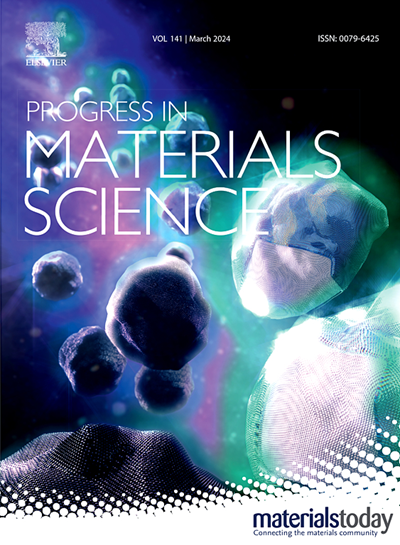高分子科学中的机器学习:物理和化学探索的新视角
IF 40
1区 材料科学
Q1 MATERIALS SCIENCE, MULTIDISCIPLINARY
引用次数: 0
摘要
聚合物作为现代工业的基础材料,由于结构的复杂性、多功能性要求和可持续性要求,在精密设计和性能改进方面面临着持续的挑战。机器学习(ML)已成为阐明结构-性能相关性和加速聚合物材料发现的变革性工具。这篇综述系统地考察了机器学习在三个领域的应用:通过反应动力学建模的自主合成,将聚合物配置与整体行为联系起来的跨尺度性质预测,以及可持续性驱动的设计框架。对于自动化合成,ML将聚合动力学与结构控制和聚合效率集成在一起,使闭环系统能够自主改进过程。在性能预测中,机器学习破译了与热弹性、光电响应和机械鲁棒性的层次结构关系,为定制材料设计提供了物理化学理论框架。关键分析解决了持续存在的局限性,包括特殊聚合物类别的数据缺乏,多模态架构的可解释性缺陷,以及模拟和实验之间的验证差距。通过将生成算法与高通量实验相结合,该策略超越了经验试错方法,建立了一种跨越分子到体尺度的计算设计范式。计算智能和聚合物科学之间的协同作用不仅简化了材料发现周期,而且还为能源存储、环保材料和自适应智能系统提供了可持续的解决方案,预示着数据驱动的大分子工程的新时代。本文章由计算机程序翻译,如有差异,请以英文原文为准。
Machine learning in polymer science: A new lens for physical and chemical exploration
Polymers, as foundational materials in modern industry, face persistent challenges in precision design and performance improvement due to structural intricacy, multifunctionality requirements, and sustainability imperatives. Machine learning (ML) has emerged as a transformative tool for elucidating structure–property correlations and expediting polymer material discovery. This review systematically examines ML applications across three domains: autonomous synthesis via reaction kinetic modeling, cross-scale property prediction linking polymeric configurations to bulk behavior, and sustainability-driven design frameworks. For automation synthesis, ML integrates polymerization kinetics with structure control and polymerization efficiency, enabling closed-loop systems for autonomous process refinement. In performance prediction, ML deciphers hierarchical architectures relationships with thermal resilience, optoelectronic responses, and mechanical robustness, providing physicochemical theory frameworks for tailored material design. Critical analyses address persistent limitations, including data paucity in specialty polymer classes, interpretability deficits in multimodal architectures, and validation gaps between simulation and experiments. By synergizing generative algorithms with high throughput experimentation, this strategy transcends empirical trial-and-error approaches, establishing a computational design paradigm spanning molecular-to-bulk scales. The resultant synergy between computational intelligence and polymer science not only streamlines material discovery cycles but also unlocks sustainable solutions for energy storage, eco-friendly materials, and adaptive smart systems, heralding a new era of data-driven macromolecular engineering.
求助全文
通过发布文献求助,成功后即可免费获取论文全文。
去求助
来源期刊

Progress in Materials Science
工程技术-材料科学:综合
CiteScore
59.60
自引率
0.80%
发文量
101
审稿时长
11.4 months
期刊介绍:
Progress in Materials Science is a journal that publishes authoritative and critical reviews of recent advances in the science of materials. The focus of the journal is on the fundamental aspects of materials science, particularly those concerning microstructure and nanostructure and their relationship to properties. Emphasis is also placed on the thermodynamics, kinetics, mechanisms, and modeling of processes within materials, as well as the understanding of material properties in engineering and other applications.
The journal welcomes reviews from authors who are active leaders in the field of materials science and have a strong scientific track record. Materials of interest include metallic, ceramic, polymeric, biological, medical, and composite materials in all forms.
Manuscripts submitted to Progress in Materials Science are generally longer than those found in other research journals. While the focus is on invited reviews, interested authors may submit a proposal for consideration. Non-invited manuscripts are required to be preceded by the submission of a proposal. Authors publishing in Progress in Materials Science have the option to publish their research via subscription or open access. Open access publication requires the author or research funder to meet a publication fee (APC).
Abstracting and indexing services for Progress in Materials Science include Current Contents, Science Citation Index Expanded, Materials Science Citation Index, Chemical Abstracts, Engineering Index, INSPEC, and Scopus.
 求助内容:
求助内容: 应助结果提醒方式:
应助结果提醒方式:


